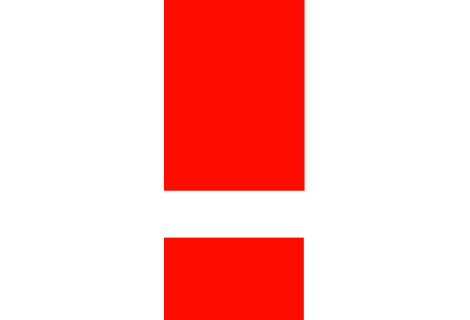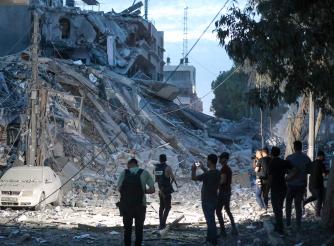“These newborn babies could simply die”: Thousands of lives at stake as hospitals in Gaza issue desperate plea as fuel stocks run almost empty

“These newborn babies could simply die”: Thousands of lives at stake as hospitals in Gaza issue desperate plea as fuel stocks run almost empty
Hospitals in Gaza are reaching breaking point as their supply of fuel runs dangerously low, putting the lives of newborn babies in incubators at grave risk. On Wednesday night, the main generator at the Indonesian hospital - one of the main hospitals in the north of the territory - went out of service. Staff are now having to rely on a secondary generator, which can service only some parts of the hospital, as they continue to receive an influx of patients from the nearby Jabalia refugee camp, which was bombed on both Tuesday and Wednesday, killing at least 195 people.
Bisan, a youth volunteer with ActionAid in Gaza, sent ActionAid this message from Al-Shifa Hospital - the largest medical facility Gaza.
“I’m now at the Al-Shifa Hospital, in the incubator department. The incubator department, as [with] all the departments in Al-Shifa Hospital, and other hospitals as well, are [under threat of] stopping working because there is no fuel in The Gaza Strip, there is no fuel entering the Gaza Strip or going to the hospitals. So more than 45 incubators just in Al-Shifa Hospital could stop. And these newborn babies could simply [die]... Because they need special care. These [babies] in incubators with an age of 42-45 weeks of pregnancy, days old, are [at] threat of [dying].”
As well as treating the wounded, hospitals in northern Gaza are acting as places of shelter for around 117,000 thousand people displaced from their homes since the war began. But without food and water, fuel to cook with, clothes or hygiene products, conditions are becoming unbearable. With only a severely limited amount of aid trickling into Gaza through the Rafah border crossing, and no way of transporting this north due to a lack of fuel and damaged roads, there is little hope of relief for millions of people in Gaza.
Zeina*, whose name has been changed to protect her identity, is one of thousands of women sheltering at Al Quds Hospital. She spoke the chaos these women are living in, day after day.
“This area that I am living in, most people [are] displaced from their homes. Our area is dangerous and [there is] no one [left] in the area. We stay in the Al Quds Hospital at night. I want to tell you something about the daily coping strategies of [women]. [In every] moment, they think about how to deal with it – all of this situation [of sheltering in] the hospital. [For] women, it is crowded [and] there are no bathrooms for them to wash [themselves]. [There is] nowhere [for them] to wash their clothes [and] since the [beginning] of the war they [have been sheltering] there.”
“[Women are] cut[ting] [empty] bottles of Coca Cola from [the top so that it can hold] water. [They wash their] bodies and clothes [with] a very [small amount of] water because [there is] not enough water [to] wash as usual. They [hang their clothes] to dry [in] any place [they can find] – on a wall, in a tree, on chairs, or inside the bathroom [on the] hanger.”
As people fight to survive in these conditions, the areas surrounding hospitals continue to be hit by bombing, severely hampering the ability of the medical facilities to continue functioning. At least 73 healthcare workers have been killed in Gaza since October 7. Many were killed while asleep at night at home with their families, in between working shifts. As the number of patients needing urgent treatment continues to rise, the Palestinian Health Ministry has issued a desperate plea urging any retired doctors and nurses or medical students to help if they can.
Riham Jafari, Communications and Advocacy Coordinator at ActionAid Palestine, said
“If fuel runs out in Gaza, it will be an unimaginable catastrophe for babies on incubators and those in intensive care units relying on ventilators. Instead of being a place where people needing urgent care are treated, hospitals have become a place where patients are sent to morgues, rather than discharged.
“But despite the enormous and impossible challenges, doctors are continuing to provide urgent care amidst indiscriminate bombings, a severe shortage of medical supplies and equipment, and without fuel to power generators. And even when doctors leave hospitals to find precious resources to help keep hospitals going and to keep people alive, they are at risk of being killed in the constant bombardment.”
The situation in Gaza’s hospitals is critical. ActionAid is seriously concerned about our partners and their ability to provide the lifesaving urgent care and shelter needed for so many people in Gaza who have faced near-constant bombing for the last 21 days.
Bisan said:
“People are suffering. The bombing is targeting crowded places in Jabalia, in refugee camps, and places that are the most crowded places in the world. The Gaza Strip is about 360 square kilometres, with a population of more than 2.25 million people. Can you imagine how crowded is this? How more than 18,000 tons can make when all this explosive force is dropped over Gaza Strip over the past 26 days.
“So, this is the demand now. Ceasefire in Gaza. Ceasefire because the explosive force of the bombs [that] were dropped on Gaza during these days is more than the explosive force of Hiroshima nuclear bomb. Ceasefire now.”
[ENDS]
Contact the ActionAid press office on uk.media@actionaid.org or on 07753 973 486.
The following spokespeople are available:
- Riham Jafari, Coordinator of Advocacy and Communication for ActionAid Palestine
- Soraida Hussein-Sabbah, Gender and Advocacy Specialist at Alianza por la Solidaridad (ActionAid in Spain) is currently in Ramallah.
Please contact the press office to arrange.
About ActionAid
ActionAid is a global federation working with more than 41 million people living in more than 71 of the world’s poorest countries. We want to see a just, fair, and sustainable world, in which everybody enjoys the right to a life of dignity, and freedom from poverty and oppression. We work to achieve social justice and gender equality and to eradicate poverty.


